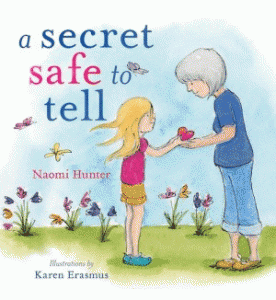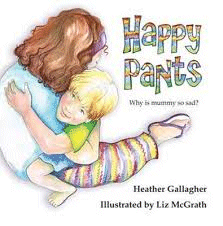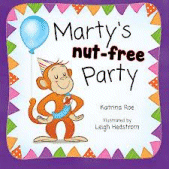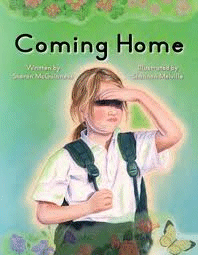A Secret Safe to Tell
Naomi Hunter
Karen Erasmus
JoJo Publishing, 2014
pbk, 32pp., RRP $A16.95
9780987587916
“He said I would get into BIG TROUBLE if I told anyone… I never wanted to be bad.”
“He said I would UPSET a lot of people if they knew what I had done…I didn’t want to make anyone cry”
“He made hurts in places where Band-Aids could not reach…”
“I tried to heal the pain but I wasn’t strong enough.”
“I thought about TELLING…but he said I’d be a LIAR… and no one would ever believe me.”
One in five children will be sexually assaulted in some way before their 18th birthday.
I remember being told that stark fact at a staff meeting in 1990 and, like many of my colleagues, didn’t really understand it let alone grasp its reality. That sort of thing didn’t happen to kids at our school, to kids we knew. But as we undertook courses in protective behaviours and mandatory reporting the reality started to hit. Sadly, it would seem that nearly 25 years later the statistics haven’t changed according to Bravehearts but the awareness has. Sadly, given the Royal Commission and the prosecution of some high profile personalities, it is clear that this does happen to kids in our school and kids we know. But, because of that Royal Commission and those prosecutions, there is a greater awareness of the problem and children are finding the courage to tell and adults are taking the time to listen.
A Safe Secret to Tell, written by someone whose dedication makes it plain that she was a victim, is a step in helping empower young children to tell, and if the first person doesn’t listen then keep on telling until someone does. Tenderly capturing the thoughts and emotions of someone who has been abused – “My heart felt BROKEN… I think it started to CHANGE COLOUR”- this story will speak to the child and perhaps give them the courage to speak too, so they too can break his power and swing HIGH into the sky where his hands cannot reach. AT the end of the book there is a list of numbers a child can call and know there is someone who will listen and act on what they have to say.
On September 12, Bravehearts will host its annual White Balloon Day and is asking the question, “Who are you protecting?’ (#whoRUprotecting) and encouraging each of us to snap a #whoRUprotecting selfie: Answer the question ‘who are you protecting’ by writing a name on your palm and display the answer in a photograph.
When Tom from Int Books sent me this book to review, I read it and put it aside knowing there would be a perfect time to share it. This is that time. Difficult though this subject may be and difficult though this review has been, the children in your school deserve to have access to this book – you just never know whose life it might change.



